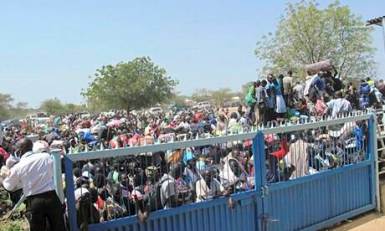Bor escape route closed after rebel attack: reports
December 23, 2013 (JUBA) – Residents of the besieged Jonglei state capital Bor said a key docking site was closed following an attack on Sunday, blocking the only access route for those attempting to flee the violence to Lakes state.

Senior members of the Jonglei state government and their families are among those taking refuge in Guol-yar, a Lakes state fishing centre located about one hour west of Bor.
At least 20,000 people have now crossed to Lakes state from Jonglei since rebel forces led by defected army commander of division eight in Jonglei, Gen. Peter Gadet Yak seized control of Bor last week.
The United Nations Mission in South Sudan (UNMISS) says at least 14,000 civilians have sought refuge at its base in Bor, where a humanitarian crisis is looming, although water and limited shelters are being provided by UN agencies.
Fighting erupted in the South Sudan capital, Juba, on 15 December after clashes between rival factions of the presidential guards.
President Salva Kiir accused his former deputy, sacked in a July cabinet reshuffle, of staging a coup.
Machar denied the accusations, but now says that forces fighting the government are under his command.
The fighting, which has become increasingly tribal in nature, has spread to Jonglei and Unity states, where provincial headquarters have been taken over by rebel forces.
South Sudan’s army (SPLA) says it is trying to retake the strategic town, but attributes the delay in launching military operations as part of attempts to minimise civilian casualties, a military source told Sudan Tribune.
The UN, African Union (AU) and the international community have warned of escalating violence, calling on parties involved to enter dialogue.
At least 500 people died in Juba during the first days on the conflict, amid reports that people were being targeted based on their ethnicity.
In Bor, 20 died in the first day of the rebel assault, with many more now feared dead since large numbers of civilians were dislodged from their homes five days ago.
UNMISS began evacuating non-essential staff from Juba to Entebbe on Sunday, but denied it was abandoning vulnerable civilians.
“We are not abandoning South Sudan. We (…) will carry on in our collective resolve to work with and for the people of South Sudan”, the head of UNMISS, Hilde Johnson, said in a press state extended to Sudan Tribune on Sunday.
Some 5,000 people initially crossed to Guol-yar the day after Bor fell under rebel control, and that number has continued to grow.
“There are thousands of us here, but the situation is becoming unbearable”, said David Malual Wuor, who escaped unhurt after hiring a boat last Wednesday.
“There is no clean water, no food stock and no medication, it is becoming a huge crisis”, added Wuor, who is a dean of students at John Garang Memorial University in Bor.
For displaced people still in the Bor area, conditions also remain increasingly harsh, with residents saying there is an “acute lack of food”.
“Crossing to Lakes state was a better alternative, but with its (the dock) closure, people are going to continue suffering in the bush”, a resident who identified himself as John Deng told Sudan Tribune.
(ST)
Read all Sudan Tribune‘s coverage of the crisis in South Sudan here:
The latest tweets on the crisis in South Sudan:
